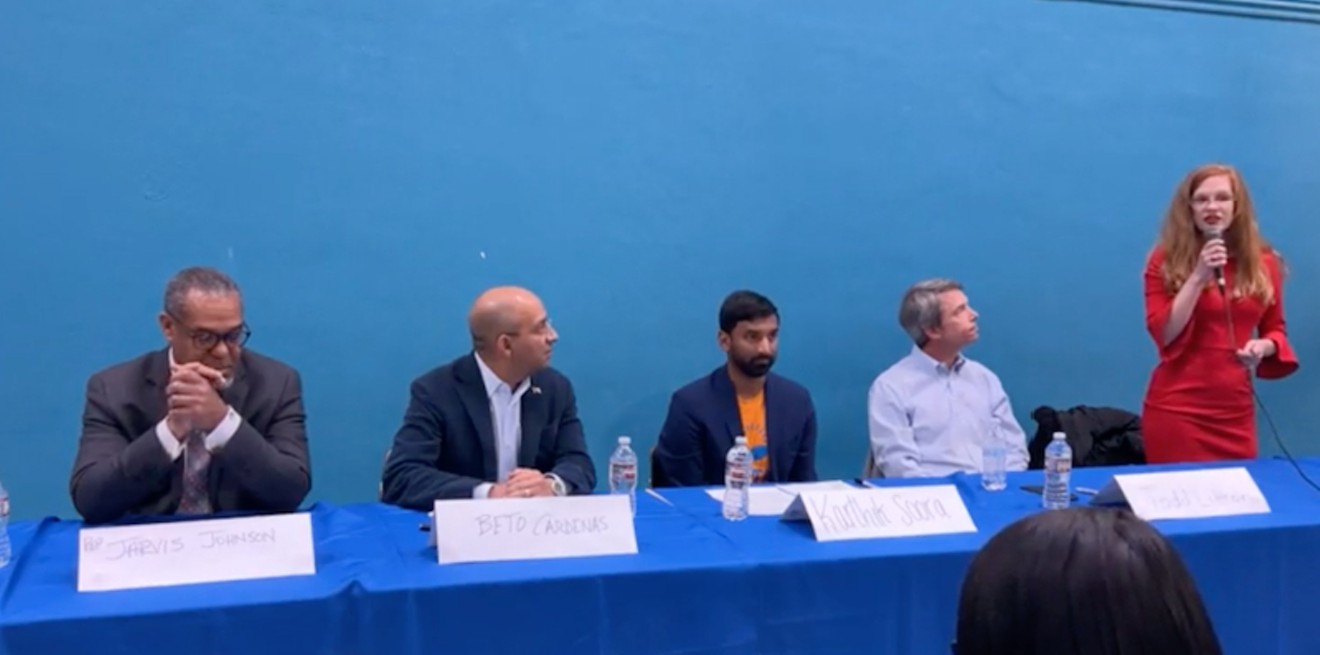The race to succeed Houston Mayor John Whitmire’s seat in the Texas Senate started at the bottom of the ballot during the March primaries but has now moved to the top of most Houston-area voter’s tickets.
State Representative Jarvis Johnson and emergency room nurse Molly Cook are going head-to-head in Saturday’s special election to represent Senate District 15 for the remainder of Whitmire’s current term, which runs through the end of the year.
These two Democratic candidates came out as the lead contenders against four other challengers in March, forcing them into a run-off that will take place later this month.
Johnson came out with 36.1 percent of the total vote to Cook’s 20.6 percent. According to Nancy Sims, a University of Houston political science lecturer, whoever wins to take over temporarily until the next election will largely depend on turnout.
Sims describes the type of voter coming out to the polls to cast their ballot in the special election as the habitual voter. This individual knows who they want to vote for, who these candidates are, and what they stand for.
“Nothing that’s happened previously should impact this election because there’s such a small number of voters that they’re well aware of the candidates,” Sims said. “So, any previous campaigning probably goes out the window.”
Cook and Johnson’s top legislative priorities intersect with one another and many other Democratic candidates: the expansion of Medicaid, access to reproductive rights and increased funding for public education — among others.
However, they differ in their approach to passing measures that embody these efforts, largely because of their backgrounds. Throughout the campaign trail, Johnson has referenced that his status as a seasoned politician — having served as a representative since 2016 and a Houston City Council member before that — would help him have the relationships to get the job done.
Cook countered that her experience as a grassroots organizer and healthcare professional would allow her to advocate for the community when it matters, not compromise, and breathe life into a legislative body she says needs it.
In the weeks before the special election, Cook went on the offensive against her opponent. She called into question his voting record, exclaiming to attendees at a debate hosted by the Bayou Blue Democrats that he had disappointed his constituency despite both being on the same side.
“If somebody’s running on their experience, their experience deserves to be examined,” Cook said. “If somebody has let us down, which I think my opponent has let us down in Austin a few times, then you need to take a critical look at that experience before you walk into the booth.”
During the April debate, Cook took issue with votes Johnson missed and votes he took, such as approving House Bill 3924 in 2021, which she said chipped away at the Affordable Care Act.
Johnson combated Cook’s claims, explaining that the votes he did not participate in fell during the 2021 quorum break Democrats took to in response to a restrictive Republican-backed law that banned 24-hour voting and curbside voting.
In a separate conversation with the Houston Press, Johnson said that he was the co-author of the bill to expand postpartum Medicaid coverage. He questioned why he would want to restrict healthcare access if he helped write legislation that increased it.
Cook had also said Johnson missed a vote that would've protected medication abortions. He said his opponent misrepresented his votes. He said his opponent misrepresented his votes, as there have been bills that lawmakers amended to mitigate the harm the legislation could have caused as initially drafted.
“When you talk about being an effective lawmaker, there are often times when you have to find common ground or find some compromise,” Johnson said. "When you look at bills by which we've had to amend to try to mitigate some of the harm that we think is being done. So we'll amend those bills and add something to it, and I think that is what my compromise is.”
“I can vote for the amendment. But if I vote against the bill, guess what? I'll never be able to amend another bill in the future because I'm going to let you put an amendment on my bill, and then you vote for your amendment, and then you vote against my bill. Why would I let you do that again?” he added. “It’s politics. You have to compromise, especially when you’re in the minority party.”
Cook has also criticized Johnson’s funding stream. Most notably, the Charter Schools Now political action committee, which she said has ties to the American Federation of Children. This super PAC is funded by Trump donors such as Texas oil tycoon Tim Dunn and pro-voucher advocates like former American Federation of Children chair and U.S. Secretary of Education Betsy DeVos.
Johnson received roughly $110,000 from the Charter Schools Now PAC.
“[She’s] trying to say that people who gave me money who are pro-voucher makes me pro-voucher? When I’m the very voice that has fought against vouchers?” Johnson said. “If somebody donates money to me, it does not mean I am going to be a yes man, or I am going to do everything they say to do.
Johnson also uses his endorsement from the Texas American Federation of Teachers to show he is anti-voucher and pro-funding public education.
Despite the union's support of Johnson, Texas AFT's website has an article condemning the Charter Schools Now PAC's efforts to undermine public education.
Cook said she would not take funds from PACs tied to these kinds of donors to guarantee that those voting for her could trust her. Johnson fought her over this claim, asking her if she screened with the PAC, to which she confirmed this — but argued she screened with every PAC.
“The most important thing is that you can trust me,” Cook said. “You want somebody in that seat that you trust to say the right things, to vote the right way, to not take dark, Republican money and to show up over and over again.”
The final opportunity for voters to turn up to the polls for the special election is on Election Day, Saturday, May 4. Whoever wins the race will serve in place of Whitmire until the end of December.
Despite the victory, Cook and Jarvis will face off again on Tuesday, May 28, to secure the Democratic nomination against the sole Republican candidate, investor Joseph Trahan.
“You kind of have to take an eraser to March when you’re at 1 percent voter turnout, anything can happen,” Sims said.
Sims recalled a similar House race from several years back between former representative Anna Eastman and Penny Morales Shaw (D-148). Eastman got elected in a special session and served a brief stint before Shaw beat her in the Democratic primary.
“You could see that situation repeat itself here like Cook could win this Saturday, but Johnson could win in three weeks,” she added.
Support Us
Houston's independent source of
local news and culture
account
- Welcome,
Insider - Login
- My Account
- My Newsletters
- Contribute
- Contact Us
- Sign out
Two Candidates Try To Take Over Mayor John Whitmire's Senate Seat...Twice?
Faith Bugenhagen May 2, 2024 5:00AM

Molly Cook (standing) at a January Senate District candidate forum with Texas. Rep Jarvis Johnson. (far left).
Screenshot
[
{
"name": "Related Stories / Support Us Combo",
"component": "11591218",
"insertPoint": "4",
"requiredCountToDisplay": "4"
},{
"name": "Air - Billboard - Inline Content",
"component": "11591214",
"insertPoint": "2/3",
"requiredCountToDisplay": "7"
},{
"name": "R1 - Beta - Mobile Only",
"component": "12287027",
"insertPoint": "8",
"requiredCountToDisplay": "8"
},{
"name": "Air - MediumRectangle - Inline Content - Mobile Display Size 2",
"component": "11591215",
"insertPoint": "12",
"requiredCountToDisplay": "12"
},{
"name": "Air - MediumRectangle - Inline Content - Mobile Display Size 2",
"component": "11591215",
"insertPoint": "4th",
"startingPoint": "16",
"requiredCountToDisplay": "12"
}
]
KEEP THE HOUSTON PRESS FREE...
Since we started the Houston Press, it has been defined as the free, independent voice of Houston, and we'd like to keep it that way. With local media under siege, it's more important than ever for us to rally support behind funding our local journalism. You can help by participating in our "I Support" program, allowing us to keep offering readers access to our incisive coverage of local news, food and culture with no paywalls.
Trending News
- Wraparound Specialists and Other HISD Employees Told They Are Out of Jobs
- Five Best Prop Bets for Huge Tom Brady Roast on Netflix Sunday
- In Face of NFL Resistance, UH Will Add Alternate Blue Uniform for All Sports
-
Sponsored Content From: [%sponsoredBy%]
[%title%]

Don't Miss Out
SIGN UP for the latest
news, free stuff and more!
Become a member to support the independent voice of Houston
and help keep the future of the Houston Press FREE
Use of this website constitutes acceptance of our
terms of use,
our cookies policy, and our
privacy policy
The Houston Press may earn a portion of sales from products & services purchased through links on our site from our
affiliate partners.
©2024
Houston Press, LP. All rights reserved.





